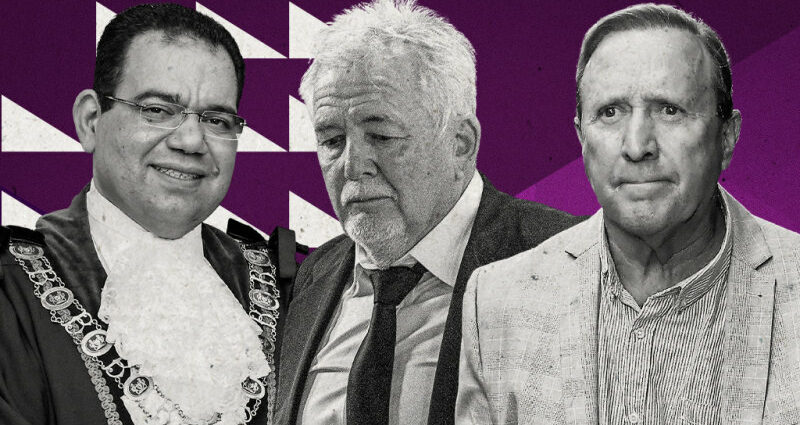Save articles for later
Add articles to your saved list and come back to them any time.
The murky picture IBAC’s Operation Sandon report paints of this state’s backroom, cash-for-access political culture highlights how far Victoria has to go to clean up its governance act, or Acts.
The lessons learned are not just about dodgy councillors. But let’s start there.
Developer John Woodman on St Kilda Road on the day IBAC’s report was tabled.Credit: Eddie Jim
Over years, developer and consultant John Woodman doled out more than $1 million in alleged bribes to Casey councillors he came to regard as his “puppets” in exchange for favourable planning decisions.
IBAC and The Age exposed a blatant disdain for good governance at Casey despite the council presiding over one of the biggest and fastest-growing municipalities in Australia.
On top of inducements and donations, councillors repeatedly failed to declare blatant conflicts of interest when making planning decisions, seemingly with no fear of penalty.
While Victoria’s 78 other councils should not be judged by Casey’s low standards, action to improve local governance is much-needed, especially around conflicts of interest, to ensure that this saga is not repeated elsewhere.
A key IBAC recommendation is for the state to reduce corruption risks by stripping councillors of statutory planning decisions. On Thursday, Premier Andrews agreed that the role of councils in “significant planning decisions” should be reduced.
Whether this move is the best way forward for Victoria is arguable and will be hotly debated.
IBAC also recommends the government look at reducing the ‘honey pot’ effect that flows from the massive uplift in values generated from rezoning land on the urban fringe by extending existing, but limited, windfall gains tax.
Critics have long argued that such windfalls are irresistible to speculators and developers and can be used in turn to pressure politicians to continue opening up the urban frontier.
For a government trying to rein in urban sprawl and in desperate need of funds for social housing, it’s an idea that seems to make policy sense.
Predictably, the state’s response to Sandon focussed on local council failings. If only it were that simple.
In fact, Sandon shows Woodman poured almost $1 million into Liberal and Labor coffers over nine years, buying access to state MPs and candidates, and, in some cases, their active backing for favourable planning decisions.
There is a consensus among integrity experts that the Andrews government’s 2018 donation reforms need further fine-tuning to reduce the temptation for MPs and aspiring MPs to chase developer donations.
Screamingly obvious also is the need for a consistent approach to donations at all levels of government across the country. There is no cap on donations at the local or federal level, a ludicrous situation when caps exist at state level.
Sandon also strengthens the case also for a total ban on developer donations – as applies in NSW – and for a cap on campaign spending to reduce the arms race between political parties.
In Victoria none of the schmoozing between developers and MPs is subject to conflict-of-interest rules and such meetings and communications are not recorded.
Victoria has fallen behind both NSW and Queensland in our regulation of lobbying and government transparency, including the publication of ministerial diaries and greater scrutiny of politically appointed ministerial advisers.
Premier Daniel Andrews says changes are likely around the state’s planning powers.Credit: Wayne Taylor
The Sandon report has reinforced the importance of an anti-corruption agency willing and able to tackle tough investigations. Along with The Age, IBAC has identified gross failings at local and state level that somehow escaped the notice of MPs and political leaders, Labor and the Coalition for many years.
However, the painfully careful wording of the Sandon report highlights how the agency is hamstrung compared, for instance, to its equivalent ICAC in NSW.
Corruption is defined differently in the two states. The NSW definition is broader and includes conduct of a public official involving dishonesty or a breach of public trust or, for instance, alleged breaches of the NSW ministerial and MP’s codes of conduct.
Sandon has surely made the case for governance and integrity reform at the local and state level, including of the IBAC Act to at least meet Australian best practice.
Get the day’s breaking news, entertainment ideas and a long read to enjoy. Sign up to receive our Evening Edition newsletter here.
Most Viewed in National
From our partners
Source: Read Full Article
-
Baker wins landmark court case after refusing to make cake for lesbian wedding
-
Victoria Beckham is 'scared to go out' after husband David was stalked
-
Subway passenger fighting for their life after terrifying stabbing
-
Hancock appearing on ITV show after SAS 'caused uproar' at Channel 4
-
Russia mocked after ‘blowing up tank’ – that was actually a combine harvester



